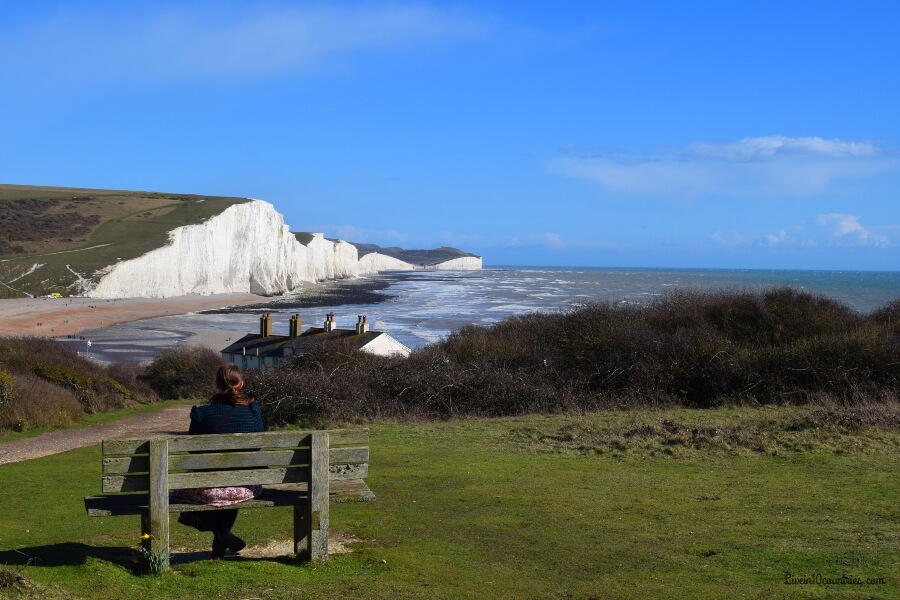If you’ve ever felt curious about life in England, Scotland, Wales or Northern Ireland (perhaps with a goal of moving to London), getting a working holiday visa for the UK is one of the easiest ways to make it happen. You’ll have the flexibility to move around, the freedom to support yourself with odd jobs and time to make all your backpacking dreams happen.
And why should I be your guide on this adventure? Well I’m a Brit by birth and after I met my other half in Australia, we started life together in the UK thanks to the working holiday programme. We’ve cried over the forms, cheered at the visa office and lived two years on a working holiday in Britain – so we know what’s up.
I’ve also interviewed a friend, Ivy, who’s having a blast on this working holiday visa for all her best tips.
A UK working holiday visa – elegibility
Perfect for anyone aged 18-30, whose goal is to travel and work to support their break (rather than the main goal being a work visa). You can also study full or part time.
You’ll also need to be a citizen of one of these countries and follow the guidelines of UK immigration:

Which countries can get a working holiday visa for the UK?
- Australia
- Uruguay
- Canada
- Japan
- New Zealand
- South Korea
- Andorra
- San Marino
- Japan
- Monaco
- Iceland
- Hong Kong
- Taiwan
What are the other requirements?
- You must be in the 18-30 age bracket (or 18 -35 if from Oz, NZ, Canada or South Korea)
- You need £2,530 in savings to cushion you
- You cannot have children who depend upon you financially or who live with you
How long is the visa for?
You’ll be able to stay for 24 months from your date of entry into the UK.

How long does the application take (and how much of a nightmare is it)?
Surprisingly, this was really a breeze.
At least, applying as an Australian citizen, my other half found it took less than an hour and involved following clear and simple instructions.
You should apply no more than six months before you intend to rock up in the UK. You’ll need basic identity documents, passport, address etc but nothing you wouldn’t need for most standard applications. Upload these online and be a hero – snail mail is just too painful.
After applying online, you’ve got to book an appointment to get biometric info take and have a pic snapped.
How much does a UK working holiday visa cost?
The base cost is pretty affordable compared to most visa types, at around £300.
You also need to pay the Healthcare Surcharge which access free healthcare in the UK (and it’s mandatory) at £776 per year. That jacks up the price quite a bit, but it’s also dirt cheap compared to even a couple of consultations with a private doctor.
Don’t forget to budget for other essentials – you need travel insurance to enter the UK and of course there’ll also be the flight to save up for.
Finding your feet in the first week – opening a bank account as a working holidaymaker
So you’re here and you fancy some tea and a scone.
Nope, you need to be organised right off the bat.
To get a job and get paid, you need a bank account. You’ll struggle to get a bank account without a permanent address, and yet getting a place is hard without on of those jobs we mentioned last sentence. England isn´t the worst I’ve encountered when it comes to red tape, but it does have its fair share.
Firstly, you’ll have an appointment at the post office to pick up your biometric card once you arrive and this is crucial – it’ll prove your right to remain for the next couple of years.
Next, you’ll need to open a bank account. Thankfully today this isn’t hard for working holidaymakers, you can open an account with neobanks (these have no physical branches and work via an app on your phone but they can do everything a standard bank can) such as Revolut, Starling and Monzo. Being online based, they are perfect for travellers.
If you want to get in with a traditional bank, which is what my partner did, you can make an appointment and bring with you a letter from a UK resident (such as a friend or landlord) saying that you live with them (as your proof of address) along with their council tax bill (proving where they live). Yes, this is a bit of a faff.

How to find a job on your working holiday in the UK?
Ivy, who is currently on a working holiday in the UK from Sydney, gives us her experience:
I phone interviewed with a few companies through applications through indeed.co.uk before arriving, but also applied for a role with the company I worked with back home as well. I ended up staying with my company as the pay was better and felt the transition to living in a new country would be smoother and less stressful that way.
It’s often possible to make job transfers, provided you work for a company with international branches and doing so gives you a safety net.
But it’s not something everyone can do!
If you’re in search of the classic backpacker experience, arrive at the start of the summer and choose a town on the seaside – Portsmouth, Brighton, Whitby, Cromer and much of Devon, Dorset and Cornwall all attract lots of tourists in the summer holidays. Jobs spring up around that from pulling pints to waiting tables, life guarding, selling or hiring beach equipment and more. It’s low stress, casual and also means you’re by the beach – probably where you fancy being anyway.
Other areas that are almost always hiring are chef roles, care work on a shift basis (elderly or vulnerable individuals) and office admin.
Here’s the job I’ve most enjoyed and found easy to pick up in both Australia and the UK, with the requirements and tips on getting hired.
Getting your CV out online is a good way to maximise your hunt for work. If you´re interested in photography job opportunities, you can search for photography sponsorship jobs on the Jooble job aggregator.
How to find accommodation in the UK?
I booked an Airbnb room as it was my personal preference to meet some locals and get some insight from that experience, but there are also a lot of hostels around and available if that’s the preference.
Says Ivy
Top tips from theose who’ve done it?
It depends a lot on your motives to be honest. Most people (including myself!) take the visa as an easy way to base themselves out of the UK while travelling Europe. Living in London isn’t cheap and finances as much as anything else can be stressful to deal with if you’re used to making more money back home, or don’t already have a strong support network here.
That said as Aussies in the UK and – especially London – we’re really fortunate in that there are so many of us who do this every year and in the same boat so it doesn’t have to be difficult to meet other people in a similar situation and get that support network built up pretty quickly as well. And there are plenty of expats from other countries too!
Ivy fills us in
Do some research before moving over so you know what to expect, but overall I think it’s a great experience and I’d definitely recommend it. Give yourself a chance to settle in, and if you decide after 6 months you don’t like it, you can always just go home (or to your next destination!)

Where to go? Where should you start your working holiday visa in England?
London is by far the most popular option – despite the sky-high rents, it allows you a huge range of tourist attractions, great job market and excellent transport. It’s the hub of everything.
Other major cities with plenty to do and vibrant job markets include Manchester (access to the Peak District and great city centre rental options), Birmingham (one of the country’s biggest shopping centres, great for exploring the Midlands and even Wales) and Brighton.
How can I explore Europe with the UK as my base?
Half the incentive for getting a stable base here might be that you’ll be able to see much of the continent of Europe.
It’s a great plan, after all London has four airports and France is accessible via the Channel Tunnel (take a coach or drive under the sea), Eurostar train and more.
The most popular ways to do this are Interrailing (a flexible train ticket around Europe), hiring a campervan and going road trip style or just using any and all weekends as an opportunity for a mini break.
When is the best time to go?
I’d say starting around March – June would be ideal.
This hits the UK’s bank holidays (or public holidays as they are called elsewhere) which are heavily skewed towards the spring and summer months, attracting lots of fun events and casual jobs catering to people on their days out.
It also avoids the slump after Christmas when firms are usually low on funds for hiring and hit the start of the new financial year (early April) which is a big recruitment period. Plus, you have some time to get settled before peak summer.
Can I take this visa at age 31?
If it were up to me there’d be no age limits. But no, you can’t start this working holiday once you pass 30 unless you´re from a limited set of countries: Australia, New Zealand, Canada and South Korea. I do have a list of ways to travel long term past 30, though.
So did that get you in the mood to apply? Let me know all your plans for a working holiday in the UK below in the comments.
- The best destination for your Working Holiday Visa - July 14, 2024
- The Enchanted Glade Glamping Review - April 23, 2024
- How to get a working holiday visa for the UK – a full guide - March 21, 2024

